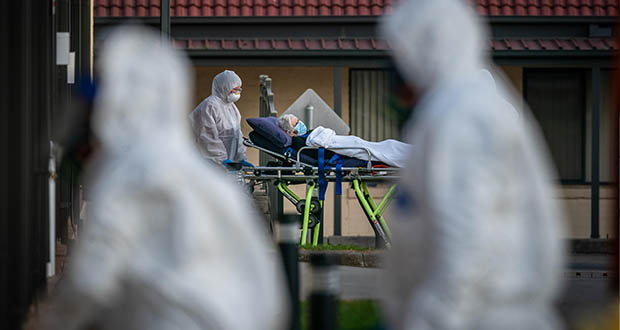Aged care providers are equipped to deal with the flu and gastro, not unprecedented worldwide pandemics.
That’s why Aged and Community Services Australia (ACSA) chief executive Patricia Sparrow believes all residents who test positive for COVID-19 should be transferred to hospital.
“Immediate transfer to hospital of the first people in residential care diagnosed with COVID is the best possible protection measure against the terrible tragedy we are seeing unfold in Victoria," Sparrow said.
“Community transmission is the enemy of aged care. Once a single case gets into a facility it can be impossible to contain. This is because aged care homes are not hospitals. They aren’t staffed like hospitals. They are not funded like hospitals. They are homes."
In Victoria, the number of deaths linked to aged care homes has climbed to more than 170, while nationally more than two- thirds of all COVID-19 deaths to date relate to people in residential aged care.
South Australia and Queensland have both pledged to send any resident who tests positive for COVID-19 to hospital and ACSA said: “We really don't understand why other states wouldn't."
A spokesperson for Uniting NSW.ACT told AAP: "The vast majority of aged care providers agree – and Uniting NSW.ACT residents and their families expect – that aged care residents who test positive to COVID-19 should be transferred to hospital for treatment."
The group, which has about 5500 residents in its care in 72 aged care homes across NSW and the ACT, said managing outbreaks within the homes is costly and inefficient.
It argued automatic hospitalisation of positive cases would break the chain of infection within aged care homes, giving facilities time to ensure adequate staffing.
"While there is still adequate hospital capacity in NSW and the ACT, why wouldn't we transfer our most vulnerable people to hospital if they contract the virus?" the spokesperson said.
In an opinion piece for The Conversation, Jed Montayre, a senior lecturer in nursing at Western Sydney University and Richard Iain Lindley, Professor of Geriatric Medicine at University of Sydney, said there are both advantages and disadvantages to consider.
They wrote that while hospitals provide specialist treatment, better infection control measures, and a much higher ratio of highly trained nursing staff, aged care facilities offer familiar faces, which the academics said may be particularly valuable during a time when residents aren’t able to see their loved ones.
“Introducing a completely new environment during an illness, particularly for residents with dementia, may do more harm than good,” Montayre and Lindley said.
“Limited knowledge about the resident could lead to unmet needs while in hospital, which could trigger behaviours that are difficult to manage.”
That line of thinking played a role in the decision not to hospitalise residents of Newmarch house, where 17 people died.
Back in May, the chief executive of Anglicare said if he could go back in time he would push to have residents who tested positive for COVID-19 at Newmarch House sent to hospital.
Grant Millard told ABC radio: “If I had my time again, I’d be insisting people who are COVID-positive go to hospital – in hindsight that would have been my preference.”
Millard complied with NSW Health’s containment strategy after the outbreak and the state’s chief health officer Dr Kerry Chant stood by the decision-making of clinicians onsite at Newmarch House.
“For many of the residents, that was their actual place of residence… when you move people from their environment they’re exposed to other risks such as falls risk, disorientation and then as a consequence get other health issues,” Chant said in May.
In his opening statement for the Royal Commission into Aged Care Quality and Safety on Monday, counsel assisting Peter Rozen said meeting records showed NSW Health in April had a preference not to move residents into hospital to avoid setting “a precedent” around transfers.
Rozen said: “We hope to understand what the precedent was that was concerning the New South Wales officials.”
And later added: “Many of the residents in aged care homes worked their entire lives to build the world class health system of which Australians are justifiably proud. They have the same right to accessing in their hour of need as the rest of the community. To put it very directly, older people are not less deserving of hospital treatment because they are old. Such an approach is ageist.”
Montayre and Lindley said hospitals may not be able to cope with such a large influx of aged care residents at one time.
“There’s an argument that if COVID-19 cases can be managed within the aged care home, they should be, to avert pressure from the hospital system.
“Worryingly though, we’ve seen reports of the health department denying requests for aged care residents with COVID-19 to be transferred to hospital.”
The duo said on balance, it’s probably better to transfer residents to hospital as soon as they test positive to COVID-19. “This offers the best chance of preventing widespread infection among other residents and staff, and disease spread from the home into the community.”
Do you have an idea for a story?Email [email protected]
 Aged Care Insite Australia's number one aged care news source
Aged Care Insite Australia's number one aged care news source

